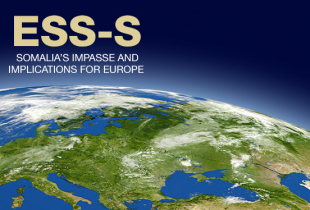
Marshall Center Participants Learn about International Anti-Corruption Measures
By Christine June
Public Affairs Office
George C. Marshall European Center for Security Studies
GARMISCH-PARTENKIRCHEN, Germany (April 22, 2015) – George Kent, senior anticorruption coordinator with the U.S. Department of State’s Bureau of European and Eurasian Affairs, gave an overview of corruption and its role in enabling transnational organized crime April 22 during his presentation on “International Anticorruption Measures and Procedures” in the Countering Narcotics and Illicit Trafficking resident program at the George C. Marshall European Center for Security Studies here.
Kent’s lecture is the first of three that will focus on “Corruption.” The second lecture will introduce participants to case studies and examine strategies and practices that have effectively worked in tackling corruption. This lecture will present recommendations for developing a comprehensive approach in the fight against corruption.
The third lecture will provide a global perspective of anti-corruption strategies and mechanisms; and will highlight various initiatives in place and the organizations involved. This lecture will also focus on the importance of involving all elements of government, civil society and businesses.
Kent leads development and advocacy of U.S. anti-corruption messages across Europe and Eurasia, outreach to governments and civil society, and work with posts and interagency colleagues on both capacity building assistance and law enforcement action.
A Senior Foreign Service officer, Kent most recently served as Director for the Office of Europe and Asia programming in the Bureau of International Narcotics and Law Enforcement, overseeing $200 million in annual programming for the rule of law, law enforcement and judicial system capacity building in the Balkans, Eurasia, parts of South Asia, and Southeast Asia.
Marshall Center’s CNIT is a two-and-a-half week resident program that focuses on 21st century national security threats as a result of illicit trafficking and other criminal activities. This resident program started April 9 and ends April 24.
Course design includes guest lecturers from national and international law enforcement and security organizations, course seminar activities discussing the range of government countermeasures to combat criminal activity, and strategy development exercises that focus on best practices and international approaches to combating these growing threats against national security.
This year’s CNIT participants hail from: Afghanistan; Albania; Algeria; Argentina; Armenia; Australia; Azerbaijan; Bahamas; Belize; Bosnia and Herzegovina; Bulgaria; Colombia; Czech Republic; Dominican Republic; Egypt; El Salvador; Fiji Islands; Georgia; Greece; Guatemala; Hungary; India; Indonesia; Japan; Jordan; Kazakhstan; Kenya; Kosovo; Malaysia; Maldives; Mauritania; Mexico; Moldova; Mongolia; Montenegro; Morocco; New Zealand; Nigeria; Oman; Peru; Philippines; Romania; Serbia; Slovenia; South Africa: Tanzania; Thailand; Turkey; Ukraine, United States; and, Uzbekistan.
This year’s CNIT course has a good mixture of participants who work at defense, interior and justice ministries, and law enforcement and other government agencies.
The course is designed for government officials and practitioners who are engaged in policy development, law enforcement, intelligence, and interdiction activities aimed at countering illicit narcotics trafficking, terrorist involvement in criminal activity, and the associated elements of transnational crime and corruption. It examines the major methods by which transnational criminal and terrorist organizations engage in illegal narcotics trafficking and other criminal activities for profit.
The mission of the Marshall Center, as a vital instrument of German-American cooperation, is to create a more stable security environment by advancing democratic institutions and relationships; promoting active, peaceful, whole-of-government approaches to address transnational and regional security challenges; and creating and enhancing enduring partnerships worldwide.
The Marshall Center offers eight resident programs that examine complex transnational, regional and international security issues: Program on Terrorism and Security Studies; Program on Applied Security Studies; Program on Security Sector Capacity Building; Seminar on Regional Security; Seminar on Transnational Civil Security; CNIT; Program on Cyber Security Studies; and, Senior Executive Seminar.


